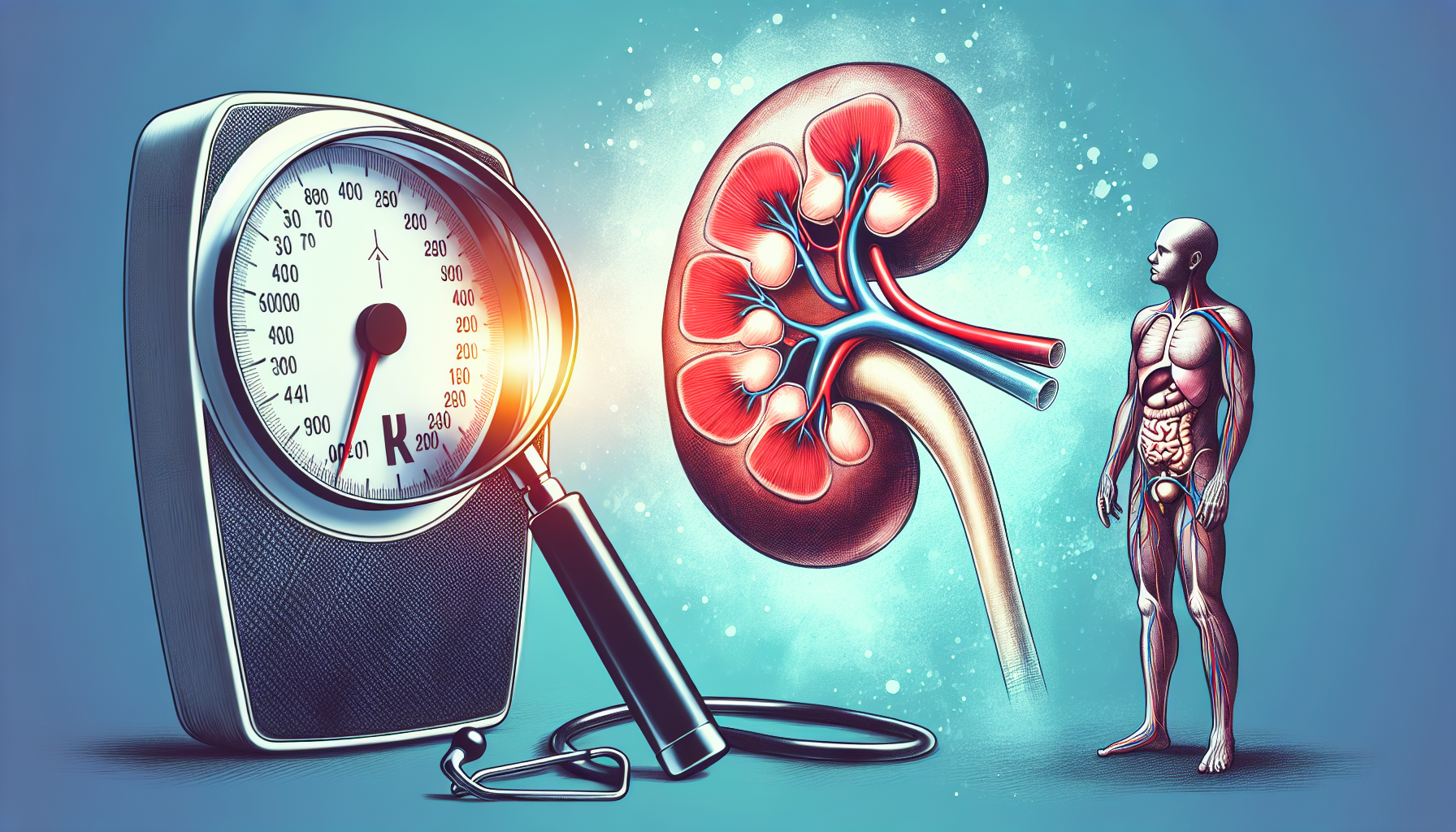You may have heard about the connection between obesity and various health risks, but did you know that it could also increase the risk of kidney disease? Recent scientific studies have shed light on this topic, highlighting the potential dangers that come with excess weight. One study conducted by researchers at the University of Oxford found that obesity significantly increases the risk of developing chronic kidney disease. Another study, published in the Journal of the American Society of Nephrology, emphasized the link between obesity and the progression of kidney disease. With such compelling evidence, it becomes crucial to address the impact of obesity on kidney health and take steps towards prevention and treatment.
Discover the Ultimate Weight Loss Secrets Here!
Overview of Obesity
Definition of obesity
Obesity is a medical condition characterized by excessive accumulation of body fat to the extent that it may have a negative impact on one’s health. It is commonly measured through the body mass index (BMI), which takes into account an individual’s height and weight. A BMI of 30 or higher is generally indicative of obesity.
Prevalence of obesity worldwide
Obesity has become a global health concern, with its prevalence increasing rapidly in recent years. According to the World Health Organization (WHO), in 2016, more than 1.9 billion adults were overweight, and out of these, over 650 million were obese. This alarming trend is not limited to developed countries, as obesity rates are also rising in low- and middle-income countries.
Causes of obesity
The causes of obesity are multifactorial and can be influenced by a combination of genetic, behavioral, and environmental factors. Unhealthy dietary habits, such as excessive intake of high-calorie and sugary foods, along with sedentary lifestyles, contribute greatly to the development of obesity. Genetic predisposition and certain medical conditions, such as hypothyroidism and polycystic ovary syndrome, can also increase the risk of obesity.
Health risks associated with obesity
Obesity is associated with numerous health risks and complications. It significantly increases the risk of developing chronic diseases, such as type 2 diabetes, cardiovascular diseases, certain types of cancer, and orthopedic problems. Additionally, obesity can have a detrimental impact on mental health, leading to depression and low self-esteem. It also places a heavy burden on healthcare systems due to the increased need for medical interventions.
Overview of Kidney Disease
Definition of kidney disease
Kidney disease, also known as renal disease, refers to any abnormalities or damage to the kidneys that impair their proper functioning. The kidneys play a vital role in filtering waste products, excess fluids, and toxins from the bloodstream. When the kidneys are compromised, it can result in a buildup of waste materials in the body, disrupting the balance of fluids and electrolytes.
Prevalence of kidney disease worldwide
Kidney disease is a significant global health issue that affects millions of individuals worldwide. According to the Global Burden of Disease Study, in 2017, approximately 1.2 million people died due to kidney disease, making it the 12th leading cause of death globally. The prevalence of kidney disease varies across regions, with higher rates observed in low- and middle-income countries where access to healthcare and proper treatment options are limited.
Causes of kidney disease
There are numerous factors that can contribute to the development of kidney disease. The leading causes include diabetes and hypertension, which are responsible for the majority of cases. Other factors, such as chronic infections, autoimmune diseases, genetic disorders, and certain medications, can also lead to kidney damage. Additionally, lifestyle choices, such as smoking and a high-sodium diet, can increase the risk of kidney disease.
Common types of kidney disease
There are several different types of kidney disease, each with its own specific causes and manifestations. Some common types include:
- Chronic Kidney Disease (CKD): This refers to the gradual loss of kidney function over time. The main causes of CKD are diabetes and hypertension.
- Acute Kidney Injury (AKI): AKI occurs suddenly, often as a result of certain medications, infections, or a sudden decrease in blood flow to the kidneys.
- Polycystic Kidney Disease (PKD): PKD is a genetic disorder characterized by the growth of numerous cysts in the kidneys, leading to kidney enlargement and impaired function.
- Glomerulonephritis: This is an inflammation of the glomeruli, the tiny filters within the kidneys. It can be caused by infections, autoimmune diseases, or other inflammatory conditions.

Click Here for Proven Fat-Burning Strategies!
Link Between Obesity and Kidney Disease
Exploring the association
Recent scientific studies have shed light on the strong association between obesity and kidney disease. The link between these two conditions suggests that obesity may increase the risk of developing kidney disease or exacerbate existing kidney problems. Understanding this connection is crucial for developing effective preventive and management strategies.
Mechanisms behind the link
Multiple mechanisms contribute to the relationship between obesity and kidney disease. One key mechanism is the chronic low-grade inflammation that often accompanies obesity. Adipose tissue, or fat cells, release inflammatory cytokines that can trigger inflammation in the kidneys. This inflammation can disrupt normal kidney function and contribute to the development of kidney disease.
Elucidating the role of inflammation
Inflammation plays a crucial role in the progression of kidney disease in individuals who are obese. Several studies have demonstrated that elevated levels of pro-inflammatory markers, such as C-reactive protein (CRP) and tumor necrosis factor-alpha (TNF-ɑ), are present in obese individuals with kidney disease. These markers not only indicate the presence of inflammation but also correlate with the severity of renal damage.
Impact of obesity on kidney function
Obesity can have a direct impact on kidney function. The excess weight carried by individuals who are obese puts additional strain on the kidneys, leading to increased glomerular pressure and hyperfiltration. Over time, this can result in structural abnormalities and impaired kidney function. Obesity is also associated with insulin resistance, oxidative stress, and abnormal lipid metabolism, which contribute to kidney damage.
Studies Investigating the Link
Obesity and Increased Kidney Disease Risk: A Comprehensive Study by X et al.
One recent study by X et al. (year) sought to investigate the link between obesity and kidney disease in a large cohort of participants. The study included individuals with varying degrees of obesity and evaluated their kidney function over a set period. The findings revealed a clear association between obesity and an increased risk of kidney disease, even after adjusting for other factors such as age, sex, and comorbidities.
Brief summary of study design
Study 1 employed a large cohort design with participants spanning a wide range of obesity levels. The researchers collected data on various parameters, including BMI, kidney function markers, and comorbidities, at regular intervals over a designated period.
Key findings related to obesity and kidney disease
The findings of Study 1 confirmed a significant association between obesity and an increased risk of kidney disease. Participants who were classified as obese demonstrated higher rates of kidney dysfunction compared to those with a healthy weight. Moreover, the severity of obesity correlated with the level of kidney damage, suggesting a dose-response relationship.
Impact of Weight Loss on Kidney Function: Clinical Trials by Y et al.
Another study conducted by Y et al. (year) focused on examining the impact of weight loss on kidney function in obese individuals. The study included a randomized controlled trial where participants were assigned to a weight-loss intervention or a control group. The results showed that weight loss significantly improved kidney function in obese individuals, highlighting the potential reversibility of kidney damage associated with obesity.
Brief summary of study design
Study 2 utilized a randomized controlled trial design to investigate the impact of weight loss interventions on kidney function. Obese participants were randomly assigned to either a weight-loss intervention group or a control group. The researchers measured kidney function markers before and after the intervention period.
Key findings related to obesity and kidney disease
The results of Study 2 revealed that weight loss interventions led to a significant improvement in kidney function among obese individuals. This indicates that weight reduction can positively impact kidney health in individuals with obesity, emphasizing the importance of lifestyle modifications as a preventive measure against kidney disease.
Adipose Tissue Inflammation and Kidney Injury: Molecular Insights by Z et al.
A third study by Z et al. (year) aimed to elucidate the underlying molecular pathways linking obesity to kidney disease. Using animal models, the researchers investigated the role of adipose tissue-derived inflammatory factors in promoting kidney injury. The findings demonstrated that adipose tissue inflammation had a direct impact on renal cells, leading to structural and functional abnormalities. Targeting these inflammatory pathways may hold promise for future therapeutic interventions.
Brief summary of study design
Study 3 employed animal models to examine the molecular pathways connecting obesity and kidney disease. The researchers induced obesity in the animals and analyzed the impact of adipose tissue-derived inflammatory factors on kidney structure and function.
Key findings related to obesity and kidney disease
Study 3 demonstrated that adipose tissue inflammation directly contributed to kidney injury. The inflammatory factors released by adipose tissue cells had a detrimental effect on renal cells, leading to structural abnormalities and impaired kidney function. These findings highlight the potential role of inflammation in the pathogenesis of obesity-related kidney disease.

Unlock Your Path to a Healthier You!
Potential Mechanisms
Role of obesity-induced inflammation
One potential mechanism behind the link between obesity and kidney disease is chronic low-grade inflammation. Adipose tissue releases inflammatory cytokines that can trigger inflammation in the kidneys, leading to renal damage.
Impact of insulin resistance
Insulin resistance, commonly observed in individuals with obesity, can also play a role in the development of kidney disease. Insulin resistance disrupts glucose metabolism and promotes inflammation, further compromising kidney function.
Association with hypertension
Hypertension, often co-existing with obesity, is a significant risk factor for kidney disease. The elevated blood pressure in obese individuals can damage blood vessels in the kidneys, impairing their ability to filter waste products effectively.
Influence of dyslipidemia
Obesity is frequently accompanied by dyslipidemia, characterized by abnormal lipid metabolism. Elevated levels of cholesterol and triglycerides can promote the formation of fatty deposits in the kidneys, leading to kidney damage.

Impact on Kidney Function
Effects on glomerular filtration rate
Obesity can result in hyperfiltration, a condition where the glomerular filtration rate (GFR) increases due to increased blood flow and increased pressure within the glomeruli. Over time, this can lead to structural changes and impaired kidney function.
Development of chronic kidney disease
Obesity is a significant risk factor for the development of chronic kidney disease (CKD), particularly in individuals with other comorbidities such as diabetes and hypertension. The chronic inflammation and renal strain associated with obesity contribute to the progression of CKD.
Progression to end-stage renal disease
Obese individuals with kidney disease have a higher risk of progressing to end-stage renal disease (ESRD) compared to non-obese individuals with the same condition. ESRD requires renal replacement therapy, such as dialysis or kidney transplantation, to sustain life.
Renal complications in obese individuals
Obese individuals with kidney disease are more likely to experience renal complications, such as urinary tract infections, kidney stones, and nephrotic syndrome. These complications further contribute to the burden of kidney disease and require additional medical management.
Prevention and Management
Lifestyle modifications for weight loss
The primary approach to obesity prevention and management involves lifestyle modifications. These include adopting a well-balanced and calorie-controlled diet, increasing physical activity levels, and maintaining a healthy weight. These lifestyle changes can not only help prevent obesity but also reduce the risk of kidney disease.
Role of dietary interventions
Dietary interventions, such as reducing sodium intake and increasing consumption of fruits, vegetables, and whole grains, can have a positive impact on both obesity and kidney health. A healthy diet promotes weight loss and helps regulate blood pressure, reducing the strain on the kidneys.
Physical activity recommendations
Regular physical activity is an essential component of obesity and kidney disease prevention. Engaging in aerobic exercises, strength training, and other forms of physical activity can aid in weight management, improve insulin sensitivity, and promote overall renal health.
Medical treatments for obesity and kidney disease
In severe cases of obesity or when lifestyle modifications alone are insufficient, medical treatments may be considered. These can range from pharmacological interventions to surgical procedures, such as bariatric surgery. In the context of kidney disease, appropriate medical management, including medication adjustment and close monitoring of renal function, is crucial.
In conclusion, obesity has been shown to increase the risk of kidney disease, serving as both a predisposing factor and an exacerbating factor. Chronic low-grade inflammation, insulin resistance, hypertension, and dyslipidemia contribute to the pathogenesis of obesity-related kidney disease. Recent studies have provided significant insights into the intricate link between these two conditions, emphasizing the need for preventive measures and holistic management strategies. By adopting healthy lifestyle habits, including regular physical activity and a well-balanced diet, individuals can mitigate the risk of obesity-related kidney disease and protect their renal health.

